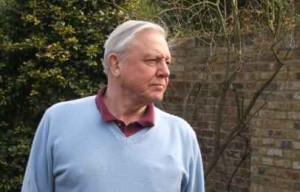In a flurry of interviews on the opening day of COP21, the UN climate talks in Paris, Sir David Attenborough, speaking with the authority few interviewers dare to counter, outlined the simple premise of the Global Apollo Project.
Media coverage of the climate crisis has been lamentably low (with the honourable exception of The Guardian and Independent) throughout 2015. Nevertheless it was encouraging to hear a clear exposition of the need to aim for an international research initiative leading to a cut within 10 years of the cost of clean electricity to below that of electricity from coal.
Just as the original Apollo programme led to men walking on the Moon within ten years, this could be a way to inspire the world to get a serious grip on climate change within a similarly short time, leading to the obvious next stage, a zero carbon world.
Sir David Attenborough, the renowned naturalist, was one of the signatories to a letter to the Guardian in September (2015) backing the Global Apollo Programme, to be funded by governments, to cut the costs of clean energy and come up with affordable technologies to store and transport solar and wind power.
“I have been lucky enough to spend my life exploring the world’s oceans, forests and deserts. But the Earth, with its spectacular variety of creatures and landscapes, is now in danger,” said Sir David. “Just one thing, however, would be enough to halt climate change. If clean energy became cheaper than coal, gas or oil, fossil fuel would simply stay in the ground.”
The letter was signed by eminent scientists, business leaders and politicians, including oil executive Lord John Browne, former energy secretary Ed Davey and climate scientist Sir Brian Hoskins.
The plan they outline would require leading governments to invest a total of $15bn (£10bn) a year in research, development (R&D) and demonstration of clean energy. That compares to the $100bn currently invested in defence R&D globally each year.
It would match the urgency of the intense Apollo programme, launched by President Kennedy’s call in 1963 to put a man on the Moon by the end of the decade:
“We choose to go to the Moon in this decade and do the other things, not because they are easy, but because they are hard; because that goal will serve to organize and measure the best of our energies and skills, because that challenge is one that we are willing to accept, one we are unwilling to postpone, and one we intend to win.”
“In the 1960s, scientists overcame immense odds to achieve something extraordinary – the Apollo missions to the Moon,” Sir David Attenborough told the Guardian. “Now some of the finest minds must again unite in the face of an even greater challenge.”
Scientists estimate that about 80% of fossil fuel reserves must stay in the ground if global warming is to be limited to 2C, a rise seen as the safety limit. Yet R&D is still paltry. The backers of Apollo, who include Unilever CEO Paul Polman, economist Lord Nicholas Stern, MP Zac Goldsmith, former chair of the Financial Services Authority Lord Adair Turner and former cabinet secretary Lord Gus O’Donnell., note that renewable energy currently receives less than 2% of publicly funded R&D.
“Public investment now will save governments huge sums in the future. What is more, a coordinated R&D plan can help bring energy bills down for billions of consumers,”
He said there were precedents for public funding for technological advance. “Most of the great advances of the last 100 years have come from publicly-funded research – computers, satellites, the internet, smart phones,” he said.
David Attenborough – Talking to a Great Broadcaster, Gareth Huw Davies is available from Amazon.

